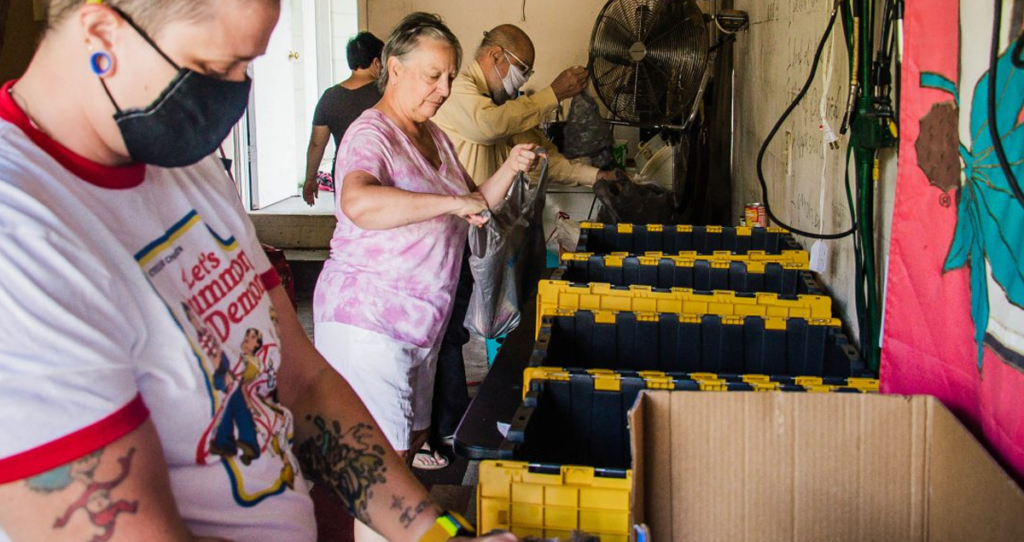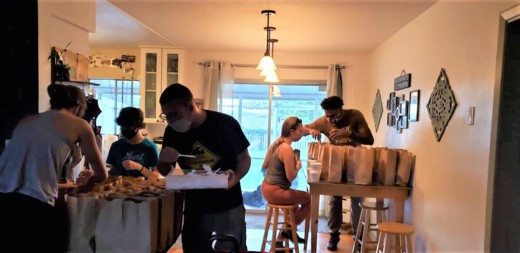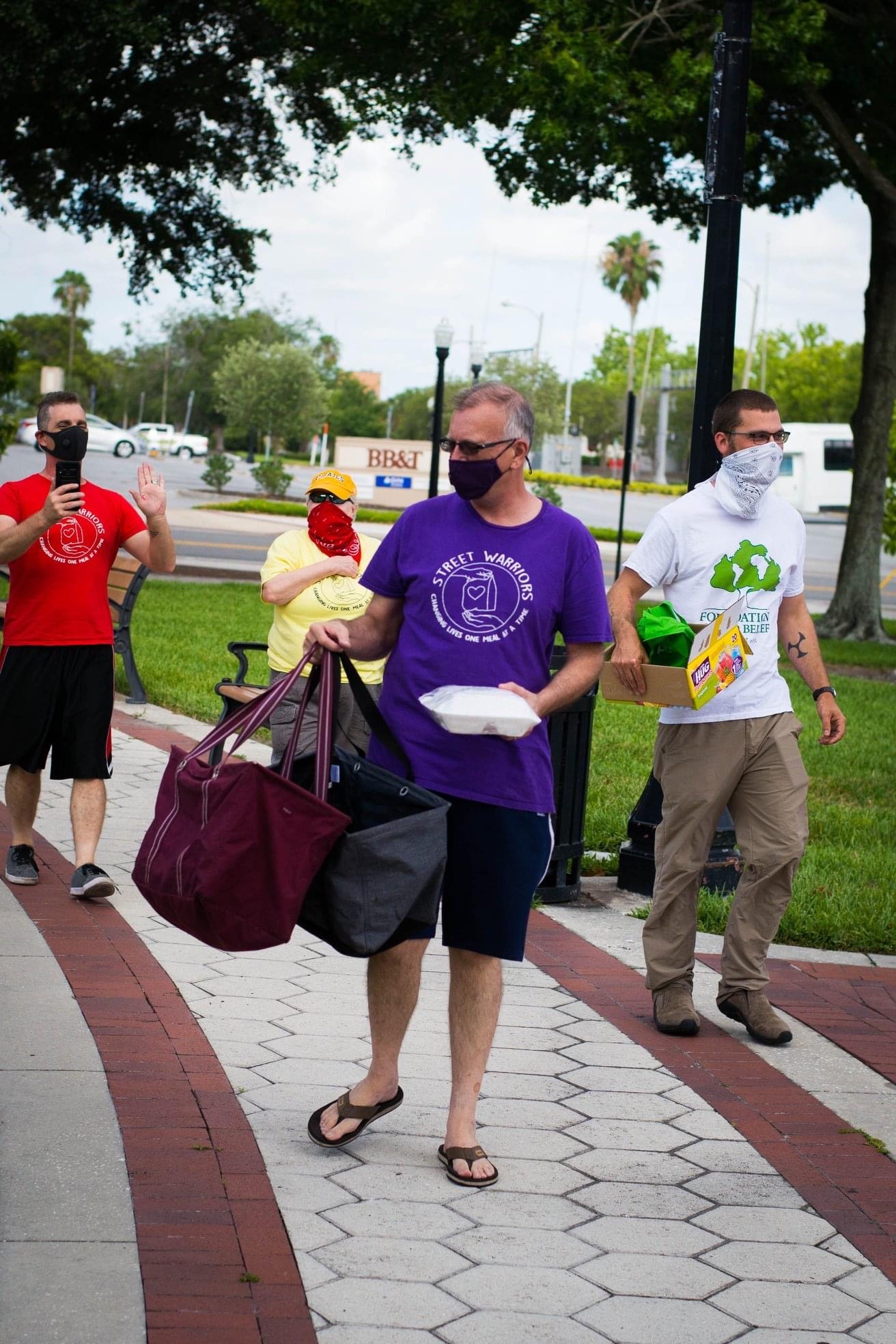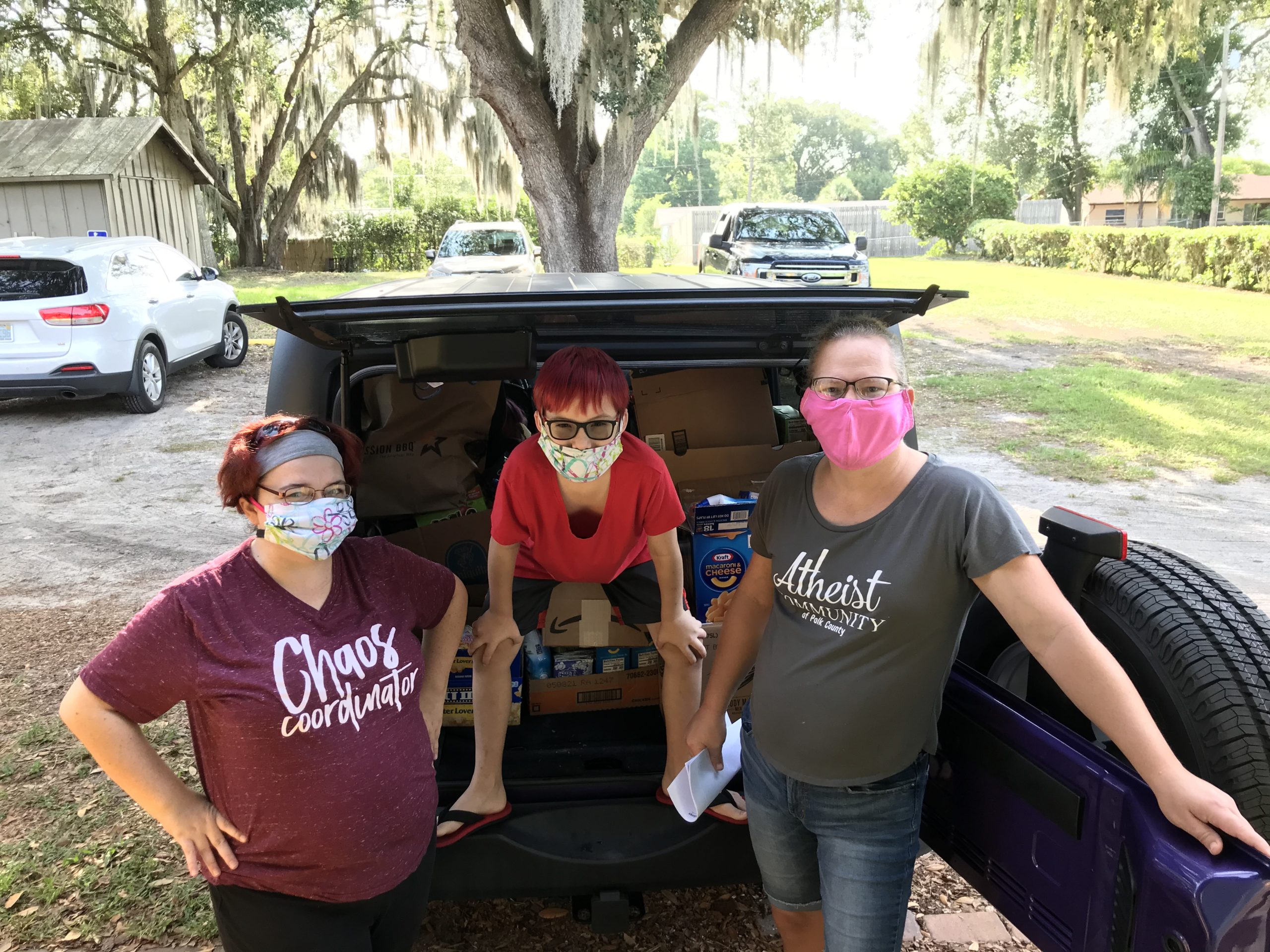
What keeps humanist food security volunteers going in Florida?
By GO HumanityFood insecurity is a tough crisis to face. What keeps front-line volunteers going? What can concerned people do, and why should they do it? And just how worth it is it, really? To answer some of these questions, we’re interviewing members of the 14 rockstar volunteer teams receiving grants through our Food Security Project. We’re featuring a new team each month, tossing volunteers a few questions to help humanize their work and people they serve.
This month we interviews Sarah Ray, co-founder and Director of Atheist Community of Polk County (ACPC). ACPC — based in Polk County, Florida —holds about a dozen events monthly in which volunteers cook, collect, and give out essentials to people in need. They’re also part of a coalition of organizations that started a successful pantry program that has been steadily growing since last year.
How did your team get started?
I knew of GO Humanity from the atheist podcast world before starting the Atheist Community of Polk County. So right off we knew we wanted to be connected in some way, and the volunteer team network was perfect!
How did your team get started doing charity work?
When we sat down to create our nonprofit in 2019, we set out to answer some core questions about who we wanted to be in the area. We knew we wanted to be a force for good, making some difference for others through humanist action. And more than that — Atheists, especially in an area like ours, face a mountain of stigma and misunderstanding. Being engaged in local charity work helps to correct those misconceptions.
Our first public event was having a team and booth at one of our local Relay for Life events. Not long after that, we connected with Robert and Steven Blansfield who run a nonprofit called Street Warriors of Central Florida (SWCF). SWCF is a small group of believers (well, until we knocked on the door!) who cook hot meals once a week to take out to people experiencing homelessness in Lakeland, FL. After volunteering with them a few times, we started talking about taking that blueprint and expanding out into other towns in the county. The Blansfields and their volunteers were excited to have us working alongside them, and we love working with them! And it’s this sort of teamwork and coalition building that helps remove that stigma about atheists and opens up so many more opportunities in our communities to make even more of a positive impact.
What’s the biggest challenge your team faces to the work you do?
I think a lot of nonprofits face a lot of the same issues whether it’s finding volunteers, keeping them engaged without burning them out, funding the programs you want to run. Our next evolution will have to include a community building with a commercial kitchen. We are all cooking and storing supplies and such at our homes and that’s working for now, but if we want to grow and expand our programs, we will have to have a home base to operate from.

What keeps you going?
Through the pandemic I think many of us were shocked to see so many people losing their income, homes, loved ones, and that opened the curtains for a lot of people to see that these problems were only the tip of a very deep iceberg. These problems were here and extreme long before COVID-19 and they will be here long after unless we all figure out a way to be part of the solution. Our team would all say they love helping people. Putting smiles on people’s faces, people who may have few reasons to smile at the moment. Knowing that, while it’s just a drop in the very large bucket, these folks will at least have had something to eat today… it feels good to do good.
What have you learned from doing service projects that you can pass along to other teams?
Just do it. Find something you’re passionate about and get going. That may be joining an existing program or starting your own. You may not have anyone show up to help at first and be OK with that.
Find out what other orgs are doing and how you can fit in. Our Director in charge of homeless outreach talked about how in one of our towns you could get a hot meal any day of the week from a few different places but there wasn’t much in the way of shelter. Another town had shelters but not a lot of places to get food. Connect with other organizations to determine the need so you can find the “thing” to make yours and not be duplicating efforts that may already have an issue covered.
But at the end of the day, you just have to decide to do it.

What are your goals for the future of the team?
We recently joined the Homeless Coalition of Polk County and hope to get involved in solving the housing crisis. We can feed people, offer them employment training or assistance, connect them with other services — but if after all of that you still aren’t sure which bridge it’ll be safe to sleep under tonight, I don’t know how we ever expect folks to heal and have a happy, healthy life. The research show this. House first. Then work on employment, drug addiction, mental health, etc. The outcomes are far more positive following that model, and we are hoping to get engaged in that work.
What else can you tell us about your challenges helping people?
We started a food bank with a coalition of organizations when COVID-19 struck to deliver parcels of grocery food to people all over the county who couldn’t get to a traditional food pantry. We serve over 250 families and it takes anywhere from 30-50 volunteers every week to make it happen. At the moment deliveries are every other weeks (at the peak we delivered weekly). We receive a truck and pick up food from a local Walmart twice a week. That’s a lot of balls to keep in the air for a group of people who are all just volunteers. The coalition leaders have our own organizations to run, with other programs and volunteers. We all have day jobs on top of that. The food pantry program is simply unsustainable without being able to hire and pay the core people that run it.

What lessons have you learned volunteering?
I’m frustrated that we’ve allowed our society to be this way. We voluntarily allow people to suffer needlessly. The problems of food insecurity, homelessness, poverty could be solved by dinnertime today if we just decided to care about others. Invest in each other. Create and fund programs to get people out of these conditions and establish safety nets to prevent anyone else from falling into them ever again. Especially here in the wealthiest nation on Earth, we could do it. By dinnertime.
I’ve learned that volunteering, running programs like this, they really are a drop in the bucket. It’s making a difference, yes, but it’s often a salve where open heart surgery is needed. And we’ve allowed our society to become such that we are all so busy with work and other commitments, in our “always on 24/7/365” culture that volunteering for programs like these gets easily set to the back burner and forgotten. And how we vote — from city councilperson to President — has perhaps the biggest impact on whether we allow these conditions to continue.
These are things I think about often. Stop the status quo. Start your thing today. Make a difference.
With just $2.50, you can help Food Security Project volunteers feed a person.

